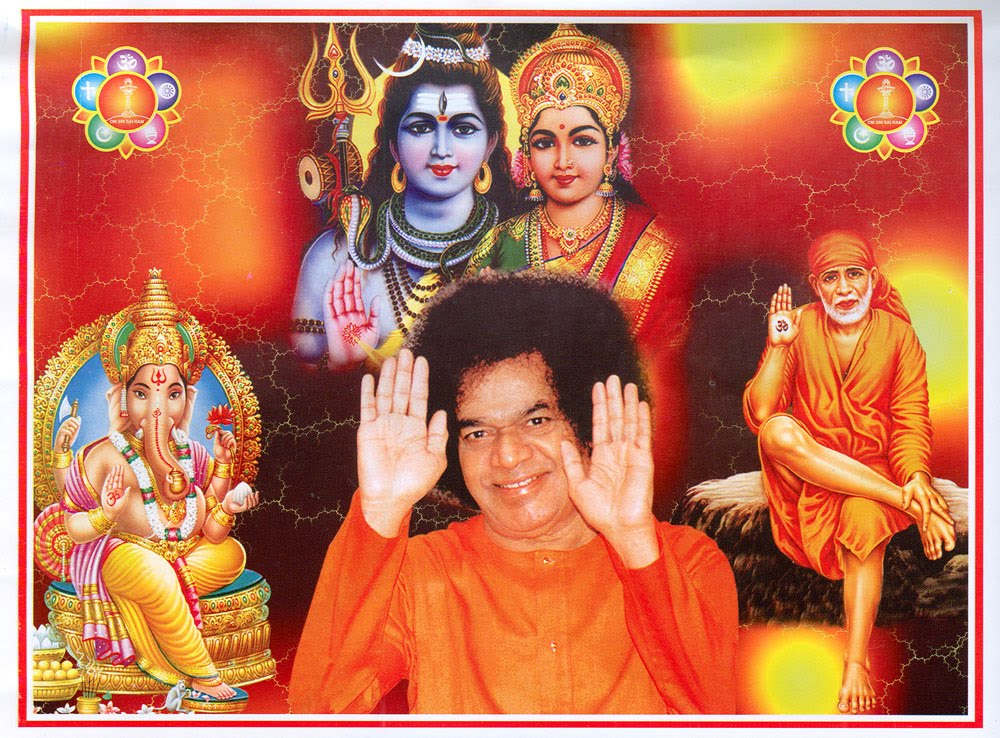¿Cuándo pueden alcanzar a Dios?
Dios no tiene ni nacimiento ni muerte; Él no tiene comienzo ni fin, ni siquiera el lapso llamado "vida" entre el nacimiento y la muerte. Siendo el "Atma" - Alma -, Él reside en los Corazones de todos. Es nuestro derecho de nacimiento experimentar nuestra verdadera Naturaleza Divina. Sin alcanzar nuestra Divinidad, podremos obtener algunas cosas, sin embargo todo ello será efímero. Si desean experimentar vuestra Divinidad, deberían desarrollar sinceridad de propósito en la vida, "Shraddha". Aquél que posea esta sinceridad de propósito lo obtendrá todo.
Únicamente cuando desarrollen una aspiración intensa y anhelante por Dios, en donde sientan que Dios es más importante que vuestra propia vida; que les es más querido que vuestra propia vida, será entonces cuando Lo alcancen. De manera similar, mientras tengan el sentimiento de "yo", de separación, no habrá manera de que puedan disfrutar y experimentar la Consciencia Divina. Donde está el "yo", no está SAI, allí no puede existir ningún "yo". Solamente cuando trascendamos la estrechez mental y el sentimiento de "yo" y "lo mío", podremos obtener la Consciencia Divina.
Cuatro clases de devotos se acercan a Dios con el propósito de cumplir sus propias aspiraciones y deseos. La primera categoría, "Arthas", se acerca a fin de obtener de Dios alivio para alguna clase de sufrimiento. "Artharthis" (los de esta categoría), Le oran con el propósito de conseguir más riqueza; placeres; confort y lujos. Un aspirante espiritual se aproxima a Dios con la plegaria de que desea tomar consciencia de que este mundo es una ilusión y que Dios es la Verdad Eterna. Pero un "Jnani", un hombre o mujer sabios, adorarán a Dios con el único propósito de Dios, y no para obtener algo más. El Amor de un "Jnani" por Dios es completo y perfecto, no existe el negocio del dar y tomar. Un "Jnani" u hombre de Sabiduría es consciente de que todo lo que ocurre en el mundo es debido a la Voluntad de Dios, por lo tanto, no necesita pedir nada.
El Amor Divino es la más elevada y pura forma de amor. ¿Puede una persona que no ha saboreado un dulce reconocer el sabor de la dulzura? Solamente cuando pongan un poquito de dulzura en vuestra boca, entonces podrán conocer lo que es la dulzura. El Amor Divino es completamente inegoísta; no está basado en el dar y recibir y es absolutamente puro. Supongan que desean pedirLe algo a Dios, pídanLe por ese Amor Divino. Una vez que experimenten el Amor Divino, cualquier otra cosa sabrá amarga, y no podrán realmente saborearla. El Amor Divino está pleno de Felicidad. Deben desarrollar este Amor y compartirlo con todos. Cuando experimenten y disfruten de vuestra propia Divinidad dentro vuestro, podrán conducir también a otros hacia la Divinidad. Si pueden lograr la Auto-Realización, todas las demás cosas vendrán por añadidura.
Esta Realización no proviene de ningún lugar más que de nuestro propio interior. Cuando un escultor desea transformar una piedra en estatua, ¿qué es lo que hace? Esa estatua no proviene del exterior para penetrar en la piedra, sino que está allí dentro de la piedra. Pero cuando retiran lo que no es la estatua en la piedra, entonces emerge la estatua. La Divinidad está dentro nuestro. Cuando eliminamos nuestra estrechez de miras, el egoísmo y el interés propio, la Divinidad se manifestará en nuestro interior. Eso es lo que es "Educare". "Educare" es la manifestación de lo que ya está dentro nuestro. El verdadero propósito de la Educación es la manifestación de esa Divinidad en nuestro interior con el propósito de servir a la sociedad. Sin abandonar la cualidad tamásica, no podrán reconocer la Verdad; sin abandonar las cualidades rajásicas, no lograrán Devoción por Dios. Es la cualidad "Sátvica" -Pureza-, la que los ayudará a desarrollar Devoción por Dios; la Palabra de SAI es el camino de la Verdad.
Estamos preocupados por el mañana, y debido a este miedo no somos capaces de prestar servicio desinteresado. Si se preguntan de dónde proviene este miedo, la respuesta es que surge de la falta completa de Fe. Cuando desarrollen la Fe de que "Dios está siempre conmigo y Él me concederá todo lo que necesite en cualquier momento", entonces no experimentarán ningún temor. Por estar siempre preocupados por el futuro, no somos capaces de hacer lo que debemos en el presente.
Donde hay Fe, hay Amor.
Donde hay Amor, hay Verdad.
Donde hay Verdad, hay Paz.
Donde hay Paz, allí está Dios.
Donde está Dios, hay Felicidad.
Lo primero y principal que deben desarrollar es la Fe, entonces podrán alcanzar la Felicidad. Deben alcanzar la Fe de que Dios ama y protege a todos y les concede todo lo que sea necesario. Solamente cuando desarrollen tal Fe y Devoción, abandonarán el egoísmo y servirán a todos desinteresadamente. Cuando tienen el sentimiento de que todos Me pertenecen, no van a amar a alguien y odiar a alguien más. Hasta si alguien los hiere, serán capaces de perdonar.
When can you attain God? – Summary of Divine Discourse on 27 May, 2016 (Evening)
God has neither birth nor death; He has no beginning, no end, not even the middle called life between birth and death. Being the atma, He resides in the heart of everyone. It is our birthright to experience our true divinity. Without attaining divinity, we may attain anything. However, all of that is a complete waste. If you want to attain divinity, you should develop sincerity of purpose in life, shraddha. One, who has this sincerity of purpose, will attain everything.
Only when you develop an intensity of aspiration and yearning for God, wherein you feel God is more than your own life, God is dearer to you than your own life – that is when you will get God. Similarly, as long as we have the feeling of 'I', of separateness, there is no way you will enjoy and experience divine consciousness. Where there is 'I', there is no Sai; where there is Sai, there cannot be any 'I'. Only when we go beyond the narrow-minded and mean feeling of 'I' and 'mine', we can attain divine consciousness.
Four kinds of devotees approach God in order to fulfil their own aspirations or desires. The first category, Arthas, come in order to get relief from God for some kind of suffering. Artharthis pray to God in order to attain more wealth, pleasures, comforts and luxuries. A spiritual aspirant approaches God with the prayer that he wants to know that this world is an illusion and God is the eternal truth. But a jnani, a true man or woman of wisdom, worships God only for the sake of God, and not for getting anything else. The love of a jnani for God is complete and perfect; there is no business of giving and taking. A jnani or a man of wisdom realises that everything that happens in the world happens according to the will of God; therefore, I need not ask for anything.
Divine love is the highest and the purest form of love. A person who cannot eat a sweet, is it possible for him to recognise the taste of sweetness? Only when you put a little of the sweet into your mouth, will you know what sweetness is. This divine love is absolutely selfless; there is no question of giving and taking and it is absolutely pure. Suppose, you want to ask something from God, ask for that divine love. Once you experience divine love, everything else will taste bitter, and you can't really relish it. Divine love is so full of bliss. You have to develop this love and share this love with others. When you enjoy and experience divinity within yourself, you can lead others also to divinity. If you can attain Self- Realisation, all other things are there with it.
This realisation does not come from anywhere else; it is there within us. When a sculptor wants to make a statue out of a stone, what does he do? That statue is not coming from outside and getting into the stone; it is there inside the stone. But when you remove what is not the statue in the stone, then the statue will emerge. Divinity is there within us. When we remove our narrow-mindedness, selfishness and self-interest, the inner divinity will manifest within us. That is what educare is. Educare is manifesting what is already there within. The true goal of education is manifestation of that divinity within us to serve the society. Without giving up the tamasik quality, you cannot recognise the Truth; without giving up rajasik quality, you will not get devotion to God; it is the satvik quality, which will help you to develop devotion to God; the word of Sai is the path of Truth.
We are worried about tomorrow. And because of this fear, we are not able to render selfless service. If you ask the question, where this fear is coming from, it is coming from lack of complete faith. When you develop faith that God is there always with me and He will grant me and give me what I need at some point of time, then you will not have any fear. By all the time worrying about future, we are not able to do what we have to do in the present.
Where there is faith, there is love. Where there is love, there is truth. Where there is truth, there is peace. Where there is peace, there is God. Where there is God, there is bliss. First and foremost, you have to develop faith and ultimately, you can attain bliss. You have to develop faith that God loves everyone and protects everyone and gives what is required. Only when you develop such faith and devotion, you will give up selfishness and serve everybody selflessly. When you have the feeling that everybody belongs to me, you are not going to love somebody and hate somebody else. Even if somebody hurts you, you will be able to forgive him.





















No hay comentarios :
Publicar un comentario